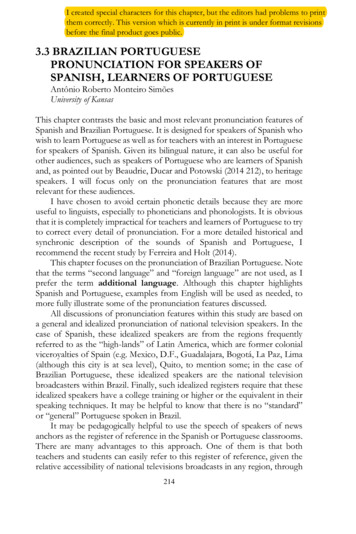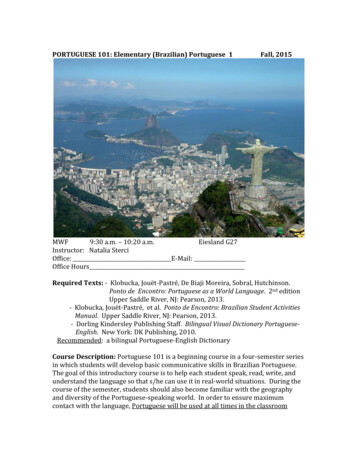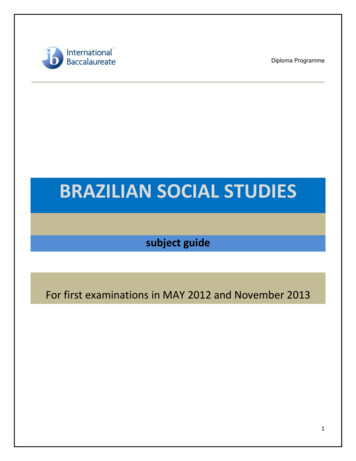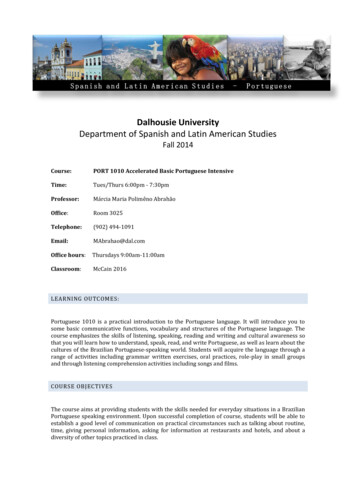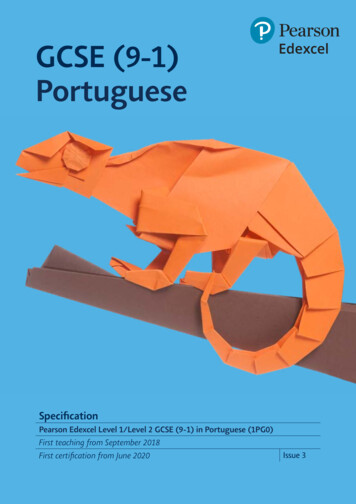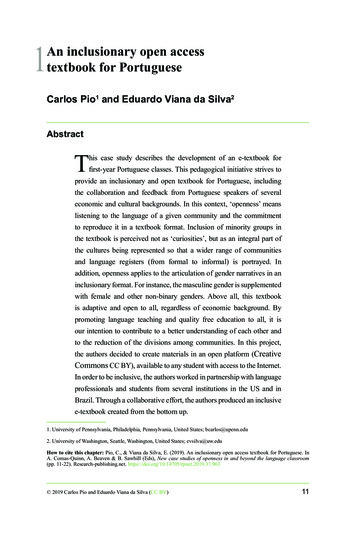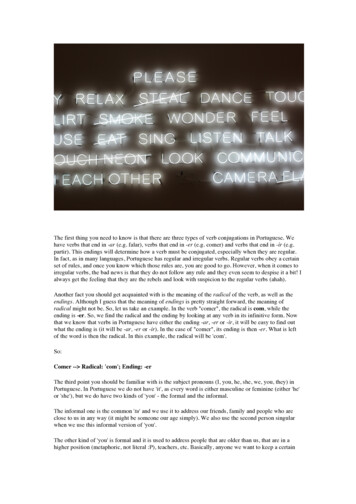
Transcription
SIMON & SCHUSTER’SPIMSLEUR BRAZILIANPORTUGUESE IREADING BOOKLET
Travelers should always check with theirnations’ State Department for currentadvisories on local conditions beforetraveling abroad.Graphic Design: Maia KennedyBrazilian Portuguese I, Third Edition and ‰ Recorded Program 2014 Simon & Schuster, Inc. Reading Booklet 2014 Simon & Schuster, Inc.Pimsleur is an imprint of Simon & Schuster Audio,a division of Simon & Schuster, Inc. Mfg. in USA.All rights reserved.
BRAZILIAN PORTUGUESE IACKNOWLEDGMENTSVoicesEnglish-Speaking Instructor . . . . . . . . Ray BrownPortuguese-Speaking Instructor . . . . Andre KuhnFemale Portuguese Speaker . . . . . . Rebeca KuhnMale Portuguese Speaker . . . . . . . . Renan LeahyCourse WritersElisabeth B. Weir Dr. Patricia I. SobralEditorsBeverly D. Heinle Mary E. GreenReviewerFernando SantosProducer & DirectorSarah H. McInnisRecording EngineerPeter S. TurpinSimon & Schuster Studios, Concord, MAiii
BRAZILIAN PORTUGUESE IReading LessonsIntroduction . . . . . . . . . . . . . . . . . . . . . . . . . . . . 1Unit Eleven . . . . . . . . . . . . . . . . . . . . . . . . . . . . .Unit Twelve . . . . . . . . . . . . . . . . . . . . . . . . . . . . .Unit Thirteen . . . . . . . . . . . . . . . . . . . . . . . . . . . .Unit Fourteen . . . . . . . . . . . . . . . . . . . . . . . . . .Unit Fifteen . . . . . . . . . . . . . . . . . . . . . . . . . . . .Unit Sixteen . . . . . . . . . . . . . . . . . . . . . . . . . . . .Unit Seventeen . . . . . . . . . . . . . . . . . . . . . . . . .Unit Eighteen . . . . . . . . . . . . . . . . . . . . . . . . . .Unit Nineteen . . . . . . . . . . . . . . . . . . . . . . . . . .Unit Twenty . . . . . . . . . . . . . . . . . . . . . . . . . . . .Unit Twenty-One . . . . . . . . . . . . . . . . . . . . . . . .Unit Twenty-Two . . . . . . . . . . . . . . . . . . . . . . .Unit Twenty-Three . . . . . . . . . . . . . . . . . . . . . .Unit Twenty-Four . . . . . . . . . . . . . . . . . . . . . . .Unit Twenty-Five . . . . . . . . . . . . . . . . . . . . . . .Unit Twenty-Six . . . . . . . . . . . . . . . . . . . . . . . .Unit Twenty-Seven . . . . . . . . . . . . . . . . . . . . . .Unit Twenty-Eight . . . . . . . . . . . . . . . . . . . . . . .Unit Twenty-Nine . . . . . . . . . . . . . . . . . . . . . . .Unit Thirty. . . . . . . . . . . . . . . . . . . . . . . . . . . . .iv7891011121314151617181920212223242526
BRAZILIAN PORTUGUESE IIntroductionPortuguese is an Ibero-Romance languagethat evolved from colloquial Latin on the IberianPeninsula around the 12th century. Currently, Portuguese is spoken on four continents and is the officiallanguage of seven countries. It is the mother tongueof about 200 million speakers in Brazil. It is alsospoken in Portugal (10.5 million), the Portugueseislands in the Atlantic, and in Portugal’s formeroverseas provinces in Africa and Asia. With over230 million speakers world-wide, Portuguese hasbeen listed as the sixth or seventh most-widelyspoken language in the world. It is also an officiallanguage of the European Union and Mercosal.Brazilian Portuguese is spoken by virtually all ofthe inhabitants of Brazil and by Brazilian emigrantsworld-wide. Brazilian Portuguese developed afterthe Portuguese colonization of the Americas andhas been influenced by the other languages withwhich it came into contact, including the Amerindianlanguages of the original inhabitants, various Africanlanguages, and, lately, European and Asian languagesas well.You may recognize many Brazilian words whichhave entered into English: samba, bossa nova,jaguar, piranha, cashew (caju), coconut (coco), açaí,etc. The word “Brazil” comes from brazilwood, a
BRAZILIAN PORTUGUESE IIntroduction (continued)tree that once grew plentifully along the Braziliancoast.The indigenous population of Brazil comprisednumerous tribal nations prior to the landing in 1500of explorer Pedro Álvares Cabral, who claimed theland for the Portuguese Empire. Brazil remained aPortuguese colony until 1808, when French forces,led by Emperor Napoleon Bonaparte, invadedPortugal and the Portuguese court relocated toBrazil. The capital of the Portuguese empire wasthen transferred from Lisbon to Rio de Janeiro. Overthe years, Brazil has had many forms of leadership:a kingdom, an empire, and a presidential republic.A military dictatorship led the nation from 1964until 1985. Since 1988, Brazil has been a federalrepublic, as defined by its constitution.The difference between the Portuguese spokenin Brazil and the Portuguese spoken in Portugal ismainly in terms of pronunciation. There are slightgrammatical differences, such as word order, formsof address, and accents. These two main variantsof Portuguese, however, are mutually intelligible:the difference between them is comparable to thatbetween British English and American English.2
BRAZILIAN PORTUGUESE IIntroduction (continued)Pimsleur’s Brazilian Portuguese I teaches theSão Paulo metropolitan accent. Even though thereare various regional accents in Brazil, regardless ofthe accent, any Brazilian Portuguese speaker canunderstand another without any effort or confusion.In other words, Pimsleur’s Brazilian Portuguese willenable you to understand Portuguese and be understood in Portuguese throughout the country.In this course, you will learn several ways toaddress people when you’re speaking to themdirectly. Whereas English has only one word for“you,” Portuguese has several. The first pair of wordsyou’ll learn is the most formal. These are a senhora,literally, “the lady,” and o senhor, “the gentleman.”For example, you’ll say A senhora fala inglês to aska woman, “Do you speak English?” and O senhoré americano? to ask a man, “Are you American?”These two forms of “you” show respect. You shoulduse them when you are first introduced to someone,and also when you’re addressing someone eitherolder than you or in a higher professional position.When you get to know someone better, you canswitch to the more informal você, which is used forboth a man and a woman. For now, take your cue fromthe Brazilian person with whom you’re conversingas to when to say você as opposed to a senhora or o3
BRAZILIAN PORTUGUESE IIntroduction (continued)senhor. Alternatively, instead of você you can justuse the person’s first name.Portuguese also has an even more familiar wordfor “you,” tu. In certain regions of Brazil it’s used withfriends, family members, and children. Young people,such as students, also use it among themselves, as dosome co-workers. Tu is not taught in this course, butif you are in certain regions in Brazil, you are likelyto hear it.Instead of formally addressing someone asdescribed above, you can use the person’s nameand title. In Brazil, in certain settings, work forexample, correct use of a title is important. However,you should never refer to yourself using a title. Forexample, when you introduce yourself, just say yourfull name: “I’m Nina Jones,” or “I’m Charles Smith.”Your Brazilian counterpart will probably do the same,although in a very informal situation, a woman mightuse her first name only.When you formally address someone by name,however, you should also use that person’s title.For a woman, you will use her title plus her firstname, for example: “Miss / Mrs. Cristina.” For aman, you’ll use senhor plus his last name: SenhorFerreira. While this may seem politically incorrectto Americans, it is common practice in Brazil.4
BRAZILIAN PORTUGUESE IIntroduction (continued)Portuguese AlphabetThe Portuguese alphabet has twenty-six letters —the same letters as the English alphabet — since thePortuguese Orthographic Language Agreement wentinto effect in 2009.Unlike English, Brazilian Portuguese pronunciation of the letters and letter combinations is fairlyconsistent. Once you know the basic guidelines, youwill be able to read Portuguese easily.Reading LessonsAfter an introduction to the spoken language,reading is integrated into the program starting inUnit Eleven. In these Reading Lessons you willlearn to sound out the Brazilian Portuguese alphabet,starting with short words, and then progressingto longer words, word combinations, and shortphrases, increasingly building in length until youwill be reading complete sentences in context. ThePortuguese alphabet is systematically introducedand you will learn to associate each letter with thesounds of Brazilian Portuguese. You will not, atfirst, be reading for meaning, but rather for sound/symbol correlation. Eventually, when the soundsystem is mastered, you will be able to look at known5
BRAZILIAN PORTUGUESE IIntroduction (continued)vocabulary and read for meaning. By the end of thecourse, you will be reading at the same level as youare speaking.The items in the Reading Lessons have beenselected especially to give you practice in theunique Brazilian Portuguese sounds and soundcombinations. Your vocabulary acquisition will beginafter you’ve learned the new, different sound system.You should read aloud, as directed. The process ofsaying the words out-loud will reinforce and enhanceyour language acquisition and will help lodge thesounds of Brazilian Portuguese in your memory. Inthese Reading Lessons, you will learn to look at theBrazilian alphabet with Brazilian eyes.There are twenty Brazilian Portuguese ReadingLessons, which start at the end of Unit Eleven. Theselessons are also combined and provided at the end ofthe course. You may choose to do the Readings alongwith their respective units, or you may wait until youhave completed the course and do them all together.Repeat the Reading Lessons as often as you wish.Instructions on how to proceed with the Readings arecontained in the audio.6
BRAZILIAN PORTUGUESE IUnit orlivrocharuto7
BRAZILIAN PORTUGUESE IUnit opapelbabelandarhorahotelo hotellistanossasabercartelbebidamartelo8
BRAZILIAN PORTUGUESE IUnit 18.19.20.cartaligarhologramaláháO hotel fica lá.viráparaestáescolasósó / comonódólareseleshorárioatrásermomáestava9
BRAZILIAN PORTUGUESE IUnit nha sobrinhaminha vizinha caminhaO senhor chega na hora.10
BRAZILIAN PORTUGUESE IUnit 8.19.20.por favorpinhacomemcomamnãomãomãeirmãtardeentendeO senhor entende?A senhora pode?condeDe onde?De onde o senhor é?A senhora é americana.O vinho é bom.Ele é de onde?O senhor caminha de tarde?Minha mãe entende espanhol.11
BRAZILIAN PORTUGUESE IUnit 8.19.20.péchãode manhãEle é conde.vintesentedentistaartistacâmbiocâmbio / comatâmaradiferenteditadocartão de créditodivertidada tardeDe nada.O senhor é diplomata.O espanhol é esperto.Ele parte de Belo Horizonte.12
BRAZILIAN PORTUGUESE IUnit o Restaurante RobertorealteatroreaiscanaismaisComo vai?ratorápidoÉ tempo demais.bananaisO pão é bom.Eles perderam a pá.A rã é rápida.O senhor recomenda o hotel?13
BRAZILIAN PORTUGUESE IUnit 18.19.20.retratomeadotaiseueu tenhoamigos seusA senhora tem reais?Sim, eu tenho reais.açúcarcriançaslicençaCom licença, senhora.É a hora do almoço.Eu não gosto.É um bom almoço.O senhor é bom de dança.Eu conheço mais o Brasil.Meu irmão vem à tarde.Cecília é minha amiga.Meu sobrinho gosta de caçar.14
BRAZILIAN PORTUGUESE IUnit 18.19.20.meu paiÉ caro.É cedo.Eles foram dançar.vocêfrancêsEu falo francês.A senhora fala inglês?avômola / metrôAlô!muitomuito bemcuidointuitoEu fui convidada.Vocês foram andar na praça?O senhor a vê?Eu fico bem só.Ele gosta de estudar línguas.15
BRAZILIAN PORTUGUESE IUnit .19.20.Eu sinto muito.Aonde você vai?São três horas.água geladanoitea grande noiteverdadediaBom dia, senhora.Boa noite.outraEu sou americano.coisaalguma coisacasaprecisaEle casou ontem.O senhor vai casar amanhã?Minha sobrinha mora na casa dos pais.Eu dou o anel de presente.16
BRAZILIAN PORTUGUESE IUnit 7.18.19.20.minha casaOnde fica sua casa?açoitepoucoduasduas cervejasjunhomeu projetoo jornal de hojeEu jogo tênis.quantoquantosquatroquartoQuanto custa uma cerveja?Uma não custa muito.Duas cervejas custam —dois reais.Quanto custam cinco cervejas?Cinco cervejas? É demais!17
BRAZILIAN PORTUGUESE IUnit 7.18.19.20.O jato é rápido.Quantos quartos o hotel tem?A viagem foi bem.Você o estaciona atrás?leiteem janeiroNão há dinheiro.Eu sou brasileiro.paguechegueportuguêsO senhor fala português?perto daquiRoberto está aqui.se você quiserno dia seguinteO senhor é um bom guia.Às quinze para as oito.O rei tem sangue azul.O mercado financeiro está complicado.18
BRAZILIAN PORTUGUESE IUnit .17.18.19.20.Eu não sei.Eu espero que ele chegue.Eu cantei a áximopróximoextraexplicartáxifalhapalhatelhaa filha da minha irmãO melhor trabalho é meu.19
BRAZILIAN PORTUGUESE IUnit 17.18.19.20.O que o senhor quer fazer?Eu não sei —o que eu vou fazer.Mas eu quero —comprar alguma coisa.Porque eu tenho dólares —e reais também.Quanto custa? Quatrocentos?Eu não tenho bastante dinheiro —para comprá-la.Bom dia, José.Que horas são?É meio-dia.Eu não entendo muito bem.Onde está a sua esposa?A minha esposa está no Recife.O que você vai beber?Eu vou beber um café.Eu posso bebê-lo, mas não posso pagá-lo.Hoje eu não tenho dinheiro.20
BRAZILIAN PORTUGUESE IUnit 17.18.19.20.Que noite mais bonita!Na semana que vem —eu vou chegar a Los Angeles.A porta está aberta.nós queremosEla fica lá.Não há nada de novo.O tempo está ruim hoje.Diga em seguida.O que o senhor quiser.Não, não são os nossos amigos.Nós vamos a São Paulo?Eu não sei, talvez.Meus amigos estão prontos.Roberto, onde você está?Feche a porta.Carlos, onde está o carro?A chuva esperada chegou.Amanhã eu vou ao Recife.Tem uma pessoa na sala da casa.21
BRAZILIAN PORTUGUESE IUnit 7.18.19.20.Nós estamos prontos, não é?O senhor Machado é do Brasil.O filme é exagerado demais!No zoológico tem dezoito zebras.Quem tem dinheiro?Todos podem.Sete pessoas passam por aqui.Vamos comer pão amanhã.Esta pessoa fala depressa demais.Este homem fala devagar demais?Você se chama João.Você tem dezesseis reais?Eu tenho só um real.Eu quero comprar as coisas —mas eu não posso.Hoje, eu pago.Hoje eu quero pagar.Amanhã você pode pagar.Está bem, eu pago amanhã.Vamos agora.22
BRAZILIAN PORTUGUESE IUnit .17.18.19.20.Dê-me um copo de leite.Com muito prazer.O que quer dizer essa palavra?Quer dizer “obrigada.”Onde fica o hotel Copacabana Palace?Siga em frente, o hotel fica à esquerda.Qual é o endereço do seu amigo?Eu te disse. Você não se lembra?Desculpe-me, eu não me lembrei.Não faz mal.Venha comigo à minha casa.Você me entendeu?Não, eu não te entendi.Eu já o disse duas vezes.Mas eu vou dizê-lo mais uma vez.Agora eu entendo.Vamos à sua casa.Eu espero que chova.Amanhã eu tenho muito trabalho.Eu viajei pela Bahia durante o mês inteiro.23
BRAZILIAN PORTUGUESE IUnit .17.18.19.20.O meu pai é professor.Ele mora em Salvador.A cidade de Salvador fica no Brasil, —perto do Oceano Atlântico.Nós não pudemos falar com eles.Você sabe o endereço dela?Eu vou tomar o avião —para ir ao Rio de Janeiro.O meu amigo me disse —que o Rio é muito bonito.Sim, é uma cidade maravilhosa.Dê-me a sua mão.Obrigada. Eu não quero —escorregar no gelo.A sua sobrinha casou?Sim, ela casou o mês passado.Como se chama o marido dela?Ele se chama Ronaldo.Ele é muito charmoso.Ronaldo canta, dança e é muito trabalhador.24
BRAZILIAN PORTUGUESE IUnit 17.18.19.20.Ele vem do México, não é?Sim, ele é mexicano —mas mora no Brasil há muitos anos.Você conhece a família dele?Não, os pais são idosos e não viajam.Eu não quero ir ao cinema.Você prefere ir —para um restaurante?Não, preciso ficar em casa.Esta tarde eu tenho —que ficar no meu quarto —porque eu estou com dor de cabeça.Eu quero papel.Quantas folhas você precisa?Umas vinte e cinco folhas.São muitas! Eu só tenho vinte.O exame foi um desastre!O que aconteceu?Eu só respondi oito perguntas.Nossa! Eu também não acabei uma parte.25
BRAZILIAN PORTUGUESE IUnit Thirty1. A Glória mora no Rio de Janeiro.2. Ela gosta muito de ir aos museus e de ir aocinema.3. Ela adora planejar viagens e também gosta deir a praia.4. A Glória tem muitas amigas.5. O seu marido, o Paulo, é professor e ele gostade ficar em casa.6. O Paulo tem poucos amigos.7. O Paulo gosta de ver o mundo no computador.8. Ele está sempre na internet.9. O Paulo só gosta de ir a restaurantes uma vezpor mês.10. Ele gosta muito do seu computador e de estarna internet.11. Quando eles viajam para Nova York,12. A Glória vai a todos os museus.13. Ela come em restaurantes e escreve para a suafamília no Brasil.14. Ela também compra muitos presentes paraa família.15. O Paulo fica no hotel e descansa muito e sócome no hotel.26
BRAZILIAN PORTUGUESE IUnit Thirty (continued)16. Ele sempre diz que pode visitar o mundono computador.17. Ela escreve muitos emails e ele escreve poucos.18. Mas eles fazem uma coisa juntos todasas noites:19. Eles tomam um cafezinho juntos e conversam.20. Eles são muito diferentes, mas eles seadoram muito.27
For more information, call1-800-831-5497 or visit us atPimsleur.com
BRAZILIAN PORTUGUESE I Portuguese Alphabet The Portuguese alphabet has twenty-six letters — the same letters as the English alphabet — since the Portuguese Orthographic Language Agreement went into effect in 2009. Unlike English, Brazilian Portuguese pronunci-ation of
